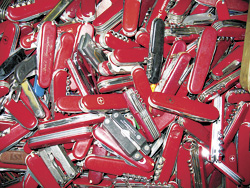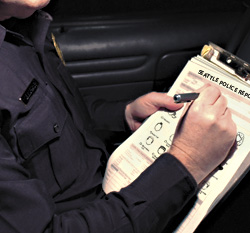If you get your prized pocketknife snatched by airport security this holiday season, you might want to put in a call to Dexter Dobbins. He’s the Transportation Security Administration’s lost-and-found guy—or something like it, anyway.
Dobbins is a flea-market scavenger who’s collected, in his estimation, between 7,000 and 10,000 knives taken from passengers at Washington airports. He gets his goods from the Auburn Retail Store, located inside a warehouse in a World War II–era compound south of the SuperMall. Here, Dobbins rummages through two dozen bins of knives, scissors, and other implements of terror to pick out winners such as 1980s Buck blades. If you’re still looking for cheap, albeit potentially blood-letting, stocking stuffers, Dobbins says markdowns average around 75 percent.
“Most of the stuff I get is pretty good,” says Dobbins, a 56-year-old Puyallup resident who sells his TSA treasures on eBay. “I go every time they open. I don’t miss a day.”
The Auburn warehouse is run by the Washington General Administration’s surplus-property program, which sells ferry boats, garish office paintings, LPs from prison radio stations, crab pots taken from poachers, and other neat stuff the government no longer needs. As of 2001, the General Administration has also sold to the public items confiscated—or voluntarily surrendered, as the feds prefer—by the TSA. It’s the only place in Washington that handles this kind of business, vending items from Seatac, Tri-Cities, and Spokane airports.
The loads of cutting, hammering, and poking tools started arriving a few months after Sept. 11, 2001. “About twice a week, we would get shipments in of at least 800 pounds,” recalls warehouse manager Bob Quimby. The store received real bullets and fake grenades, samurai swords and pool cues, a legion of corkscrews, and several ulus (Inuit cutting tools traditionally used for hunting and skinning). There were also large driftwood branches and an avalanche shovel. “It could be something they could hit somebody over the head with,” says Quimby, guessing as to why they were confiscated in the first place.
Proceeds from the sale of these items go toward providing schoolchildren with computers. But if an item has a name written on it, store employees try to contact the owner before placing it on the shelves.
Sometimes, distraught travelers call up looking for lost knives. “We tell them there’s way, way too many knives,” says Karen Jeffrey, the store’s customer-service rep. She instructs people to visit the store “and you’ll probably find something like what you had.”
Today’s shipments might come twice a month and weigh only 250 pounds, thanks to better-informed passengers and loosening TSA restrictions. “We just don’t have the area that we used to have and the depth that we used to have,” says Jeffrey. “[The shipments] might trickle down to nothing.”
That’d be a blow to bounty hunters like Dobbins. “I quit my job just to do this,” says Dobbins, who managed a Bellevue janitorial company before switching over to the TSA racket in May 2005. He guesses he’s made a $93,600 profit so far. “There [are] probably five or six other guys just like me. We depend on [the TSA].”







